
by Fern Shaw | Apr 1, 2019 | aquaid, Water Coolers
Love it or hate it, today’s that one day of the year that brings out the pranksters around the world. Personally, I’ve never been a fan, perhaps an underdeveloped sense of humour, but there’s no denying that there have been some awfully clever April Fools pranks played over the years.
Guinness Mean Time: On 31 March 1998 an article in the Financial Times detailed an agreement that had been struck between the Old Royal Observatory in Greenwich, England and the Guinness brewery, wherein Guinness would be declared the official beer sponsor of the Observatory’s millennium celebration. Greenwich Mean Time would be renamed Guinness Mean Time, and instead of counting seconds in “pips,” as was traditional, the Observatory would count them in “pint drips.” This news led to a slightly bruised ego and a curt retraction on behalf of the Financial Times when they were made aware that it was meant for April Fools.
Planetary Alignment Decreases Gravity: In 1976, British astronomer, Patrick Moore, told radio listeners that at 9.47 a.m. the earth was going to experience a feeling of less gravity. He said that Jupiter and Pluto would cross and if listeners jumped in the air at exactly 9.47 a.m. they would feel the sensation of having no gravity. Hundreds of listeners phoned the radio to say they had jumped and floated in the air.
Swiss Mountain Cleaners: The Swiss Tourism Board released a video on the 1st of April 2009 that revealed the secret of why their mountains look so clean. It was due to the hard work of the Association of Swiss Mountain Cleaners, whose members daily scaled the Alps, scrubbing the rocks of unsightly bird droppings. The cleaning not only maintained the beauty of the Alps, but also prevented the droppings from eating away at the rocks, causing cavities that might eventually lead to the complete erosion and disappearance of the mountains. Millions of people watched the video, and 30,000 took the online test to determine whether they had what it took to become a mountain cleaner (aka “Felsenputzer”). Later that year, due to popular demand, the Brunni cable car company began offering an actual mountain cleaning course that attracted would-be Felsenputzers from around the world.
Today, with all of the technology we have at hand, it’s probably unlikely that such hoaxes wouldn’t be dismissed almost immediately, but then again, perhaps it’s actually easier to fool people precisely because of the technology we have?
Rest assured, here at AquAid, although we have a fine sense of humour, it’s unlikely that we’ll be playing any April Fools on anyone this year; although that said, did I mention that we’ve been selected to supply water coolers and water to the first crewed Mars mission in 2031?
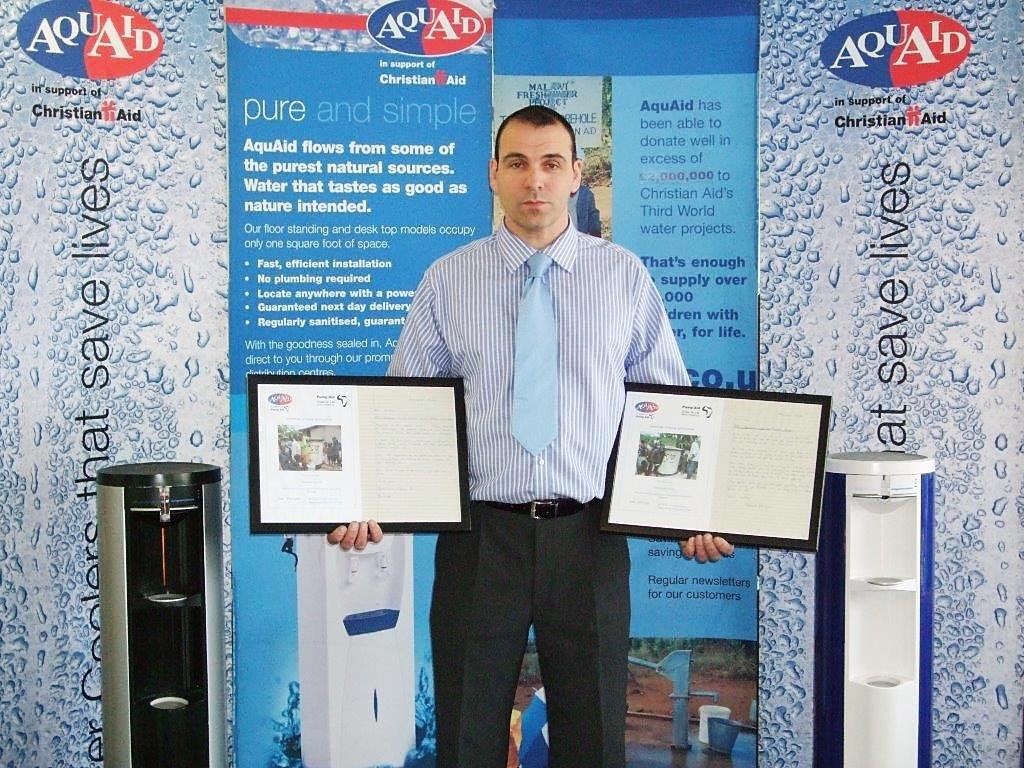
by Fern Shaw | Dec 7, 2018 | Africa Trust, aquaid tyne wear
This well-established AquAid branch opened its doors in 2002 and is now in its 16th year of operations.
AquAid Tyne & Wear is a family run company: recently, Ryan Dobson, son to owners Gordon (pictured above) & Emir Dobson, has joined the team and by all accounts is doing really well.
The Dobson’s family values dovetail well with those of AquAid itself. These values include the consistent support through 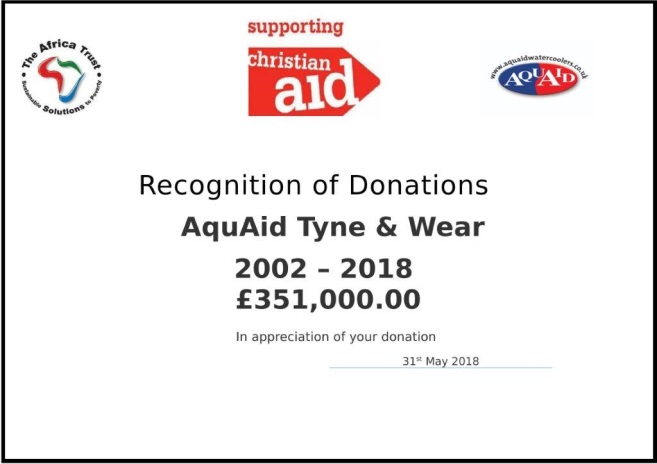 donations to sustainable charities, a practise integral to AquAid’s operations since the company’s inception in 1998.
donations to sustainable charities, a practise integral to AquAid’s operations since the company’s inception in 1998.
Recently the branch received a certificate of contribution which is in recognition of a total donation figure in the amount of £351,000 – a significant achievement by all accounts.
But AquAid Tyne & Wear aren’t just about helping those in need on far flung continents gain access to a better life. Along with their support and donations to Christian Aid & the Africa Trust, they also want to contribute locally.
As we know, December is a busy time for everyone, after a hard year, people are all about enjoying themselves and celebrating, as they should. That said, AquAid Tyne & Wear are also aware that this time of year also finds many people locally who are less fortunate and struggling quite a bit.
Ashley Harris, Media and Sales Manager at AquAid Tyne & Wear, takes up the story, “Its with this in mind that we, collectively within the company, are donating toys to children in our area who will not get these from their family at Christmas, this is via the local Salvation Army. In addition we are also helping homeless people in the North East via the local HOPE Charity with our donations of warm clothes, food, cushions, sleeping bags and anything that we think will make a difficult life easier during this cold period.

We have taken this a step further, throughout 2019 we will be putting together a monthly HOPE box for the local HOPE Charity which will include food, blankets and clothing and in the summer we will include sun cream, to mention but a few items!
Everyone in the company is more than happy to get involved as sometimes you just do not know how lucky you are!
We are hoping once our customers are aware of what we are doing they might want to join us in the HOPE box.”
To find out more about how your custom translates into ongoing charity support or how to go about donating to either HOPE or the Salvation Army in the North East, contact one of the friendly team at AquAid Tyne & Wear – they’ll be pleased to assist.
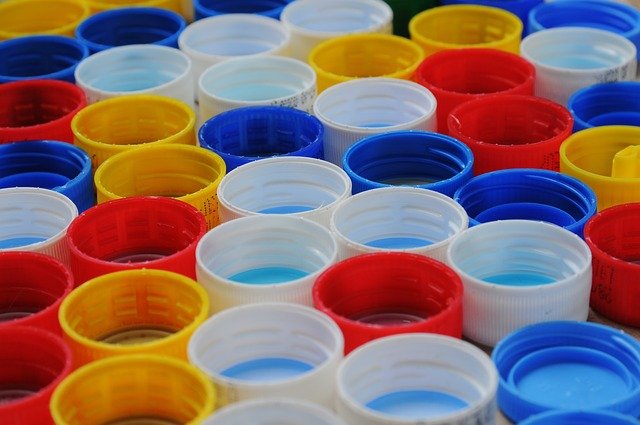
by Belinda Ollewagen | Aug 7, 2018 | aquaid, instant tap, Water Coolers
Earlier this year the European Commission announced plans to ban single-use cutlery, plates, straws, cotton buds and balloon sticks by 2021 in a new initiative to reduce marine pollution. We all know how dire the situation is with regards plastic pollution and how it affects our lands and oceans, along with animal and human life alike. So, one of the biggest reasons to switch to instant taps, mains fed water coolers or AquAid refillable 19ltr bottles reused between 30 and 35 times, is the fact that it does away with plastic bottles or greatly reduces the amount of plastic used.
The most common type of plastic pollution in our oceans is nurdles – these are the plastic pellets used to create other plastic products. Along with polystyrene, plastic bags and food containers, they make up the vast majority of marine debris, it is estimated that there are around 165 million tons of plastic pollution in the sea – and it forms the greatest threat to large marine mammals. Not only can they become entangled in the plastic which then curbs their movement and ability to find food, but ingested it can block their digestive system which ultimately leads to starvation. In addition to the physical impact of plastic pollution on creatures, it can also poison their system which in turn affects the food chain and our own source of food. It is estimated that nearly 500,000 marine mammals die each year due to plastic pollution in our oceans.
Left in landfills, plastic does not fare any better. Chlorinated plastic releases dangerous chemicals into the earth which can seep into underground water supplies harming the surrounding ecosystem and drinking water. In addition to this potential water pollution, another form of pollution is the methane gas released as plastic biodegrades which significantly adds to global warming – as arctic ice melts and recent heat waves can attest to.
While great efforts are made to promote responsible recycling, and while collectively we are doing a better job of reducing and re-using, which does minimize global impact, we still have a long way to go. And in a corporate setting one of the easiest ways to do our bit is to provide a more environmentally friendly water alternative for employees – if we can offer them safe, easily accessible drinking water via instant taps, mains fed water coolers or via our 19ltr refillable bottle, it prevents staff from having to buy small half-litre bottles of water which immediately reduces the amount of plastic being disposed of. If you need a tailored water solution that perfectly fits your needs and the needs of your employees, while also benefiting the environment – call AquAid today.

by Fern Shaw | Jul 23, 2018 | water cooler, Water Coolers
At AquAid, we’ve been in the business of water provision for over 20 years, supplying a broad range of high quality water coolers and drinking water to customers throughout the UK.
We value our customers as we understand that they are the backbone to our business, enabling us to grow from our humble beginnings in 1998 to now, one of the UK’s largest water cooler suppliers.
Just as important to us, and an integral part of our business ethos since we began, is our commitment to helping those in need. In this manner AquAid have, to date, donated more than £12 million and have helped more than 5 million people.
Another organisation, and a valued customer, committed to helping people in need is MRS Training & Rescue.
About MRS Training & Rescue
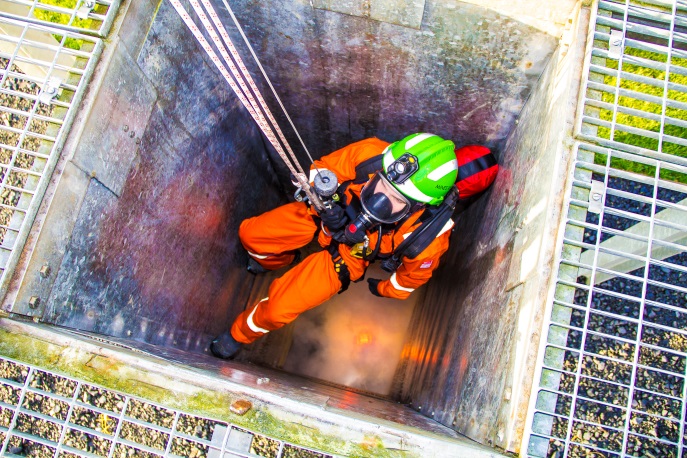 For over 100 years, MRS Training & Rescue (formerly known as Mines Rescue Service), has developed specialist skills, experience and knowledge gained from working in difficult and potentially dangerous environments, to effect the rescue and escape of mine workers from underground.
For over 100 years, MRS Training & Rescue (formerly known as Mines Rescue Service), has developed specialist skills, experience and knowledge gained from working in difficult and potentially dangerous environments, to effect the rescue and escape of mine workers from underground.
However, given the gradual decline of the coal mines over many years, they have been able to expand and diversify to meet the needs of today’s health and safety market. MRS Training & Rescue have been able to secure long term success by leveraging their expertise, and have branched out from underground mining into providing unique rescue services, specialist equipment, consultancy and a comprehensive range of accredited health and safety related products, training and services to a wide range of industries, including nuclear, aerospace, manufacturing and utilities.
MRS Training & Rescue and the Elephant Pump
In order to keep the MRS Training & Rescue team healthy and hydrated while at work, they decided to invest in water coolers from AquAid at their sites at Mansfield, Swadlincote and Knottingley. With each water cooler and bottle of water purchased a donation has been made to the Africa Trust, an AquAid funded charity.
This means that thanks to MRS Training & Rescue’s custom, a water well (affectionately known as an Elephant Pump) will be installed in Africa and will provide safe, clean drinking water for hundreds of people in a community.
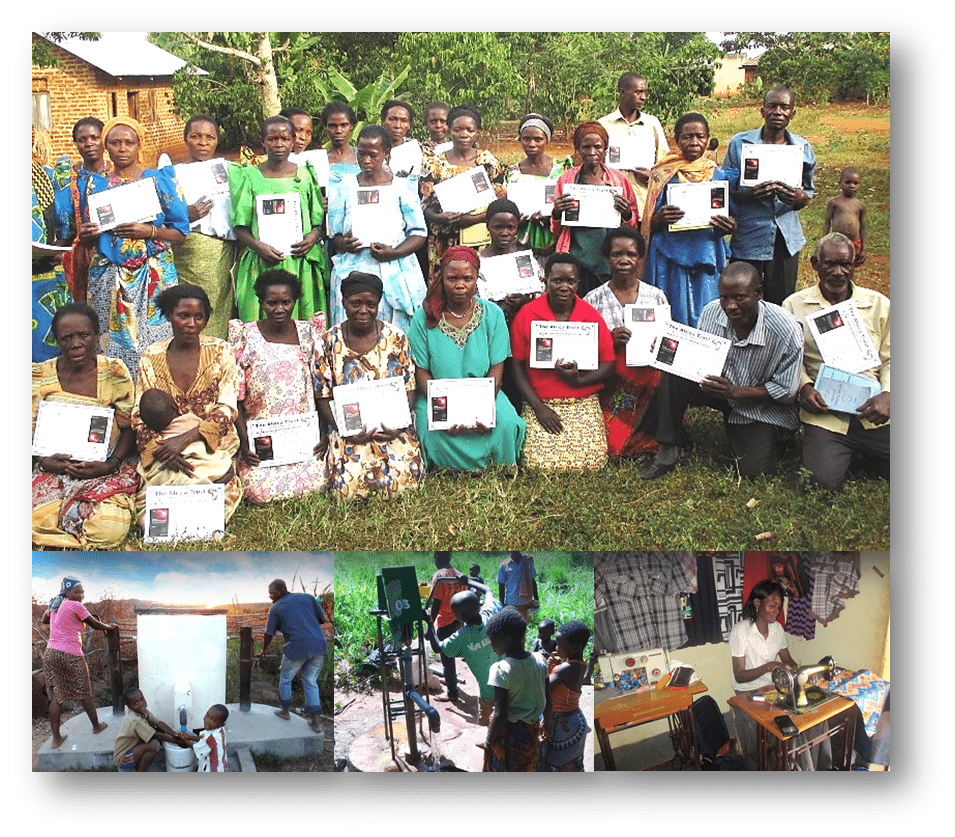
by Fern Shaw | Jun 4, 2018 | Africa Trust, aquaid, Charity, Water Coolers
Begun in 2010, the Africa Trust is an AquAid founded charity that works on the principles of wealth creation and sustainable solutions to poverty.
Since our rather humble beginnings in 1998 as a home water cooler supplier, until now, as one of the UK’s leading water cooler suppliers, helping people in need has always been an integral aspect of the AquAid ethos.
Now, in our 20th year of operations, we look back at the annual milestones that evidence the successes of our commitment to charity.

2017 IN REVIEW:
The total number of beneficiaries at the start of 2017 was 2,192,435 and 209,908 new beneficiaries were added by the end of the year. A total of 683 new pumps were installed in 2017 compared to 607 in 2016. Most of these pumps were installed in Zimbabwe with five pumps built in Tanzania and one built in Kenya.
The Africa Trust’s Elephant Pump programme is having a major positive impact on the lives of over a million Zimbabweans who collect clean drinking water and water for productive use every day. Aside from 683 new pumps installed last year, the Africa Trust continues to implement sustainable wealth creation projects. Examples are an income generating farm project which now provides a sustained and growing income stream that helps towards the cost of emergency relief. A dairy project and the bananas for fees projects continue to grow with 510 new beneficiaries added.
The Africa Trust also implements wealth creation and sustainable relief projects in:
Kenya: A business skills training programme continues to grow. One such new business started under the programme (a maize mill) now employs over a dozen HIV+ widows who would otherwise have been in desperate poverty following their husbands’ deaths due to AIDS.
Liberia: Positive feedback received about the pumps and toilets installed in previous years. A school was helped to become self-sufficient by starting a project to raise ducks and chickens.
Mozambique: The ‘Baby’ Elephant Pumps installed for use by smaller family communities are doing well.
Tanzania: Elephant Pumps; Elephant Toilets; Business Skills Training.
Uganda: Business skills training; job creation; retirement planning (thus helping break the cycle of poverty).
Contact us at AquAid to find out how becoming an AquAid customer equates to ensuring sustainable solutions to poverty and the provision of safe drinking water to those who need it most.



 donations to sustainable charities, a practise integral to AquAid’s operations since the company’s inception in 1998.
donations to sustainable charities, a practise integral to AquAid’s operations since the company’s inception in 1998.


 For over 100 years, MRS Training & Rescue (formerly known as Mines Rescue Service), has developed specialist skills, experience and knowledge gained from working in difficult and potentially dangerous environments, to effect the rescue and escape of mine workers from underground.
For over 100 years, MRS Training & Rescue (formerly known as Mines Rescue Service), has developed specialist skills, experience and knowledge gained from working in difficult and potentially dangerous environments, to effect the rescue and escape of mine workers from underground.
